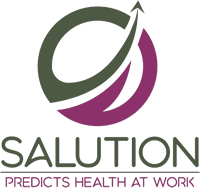
PRA
Since 2013, every employer in Germany has been obliged to carry out a risk assessment that takes into account psychological risks in the workplace (PRA) (Section 5 of the Occupational Health and Safety Act). Failure to do so may result in penalties (including those imposed by the trade supervisory office). The German Occupational Health and Safety Act also prescribes a concrete derivation of measures from the results obtained (§4 ArbSchG), as well as the obligation to document the results, the measures carried out and their effectiveness (§6 ArbSchG).
Wondering how it’s all going to work? SALUTION will be happy to support you! We conduct the PRA on the basis of the MEHQ (Munich Employee Health Questionnaire) developed by Bettina Zweck (http://www.mehq.de). According to its psychometric properties, the MEHQ is the best instrument to date for measuring psychological risks.
The results are clearly documented. If desired, we also conduct action workshops and monitor the effectiveness of the measures via a short PULSE survey.

Prediction Module
Through a short employee survey, SALUTION can predict your employees’ health status, turnover intention, and stress levels in the coming year. The results clearly show where you should start to improve the health of your employees, reduce unwanted turnover and minimize the consequences of stress.
In just one value, SALUTION shows you the level of stress for the entire company or individual teams in the areas of “health”, “willingness to change” and “stress level” and allows you to classify them as “healthy”, “neutral” or “at risk”. At the same time, our results reports allow you to see at a glance which aspects you need to address in order to reduce future costs due to absenteeism or unwanted fluctuation.

Manager Module
Due to their special (sandwich) position, managers experience a very specific strain that has not been adequately captured in existing questionnaires to date. For this reason, Bettina Zweck developed a questionnaire module specifically for measuring the working conditions of managers as part of her doctorate and validated it using more than 1,000 respondents from a representative sample (www.mehq.de).
The executive module shows a significant relationship with stress levels, health status, and turnover intention of managers. It can be ordered as a stand-alone module or in combination with the PRA or the prediction module.

Module “ES”
Satisfied employees are the heart of an organization. With the “Employee Satisfaction” module (ES), SALUTION uses an online survey to measure how satisfied your employees are in just 12 minutes. The results of this module show a significant correlation with health status and willingness to change jobs. In addition, satisfied employees are demonstrably more productive, make fewer mistakes and simply enjoy their work more. SALUTION uses this survey to show you exactly where you can start to maintain or increase employee satisfaction in the long term. Module “ES” can be carried out as a stand-alone module or in combination with a PRA.
In addition to the PRA surveys, the prediction module and the manager module, we offer you further service packages that you can combine according to your needs. We accompany you even if you have not conducted a survey in advance.
Our service packages – individually combinable

Survey of your employees
You determine the focus of your employee survey. We offer the following survey modules:
-
Psychological risk assessment (PRA): 59 questions with a survey time of approx. 12 minutes
-
Survey with prediction module: 24 questions with approx. 5-10 minutes survey time
-
Survey with manager module: 11 questions with approx. 5 minutes survey time
Each module in itself is a valid measuring instrument and delivers business-relevant results. Likewise, for all survey options, we offer a PULSE survey of approximately 3 minutes survey duration, which can be used to verify the effectiveness of the measures taken. Our surveys are based on the MEHQ questionnaire developped specifically for the PRA (www.mehq.de), based on Bettina Zweck’s dissertationhttps://edoc.ub.uni-muenchen.de/21057/
We activate the module you want, provide the survey link and accompany the survey. After carrying out each survey, you will receive a short, clear and action-oriented results report.

Presentation of results
We will present the results of the employee survey in a results presentation. There will be room for questions and discussion. We are also happy to advise you on next steps. The presentation of results usually takes place online, but we are happy to come to you on request. The target group is all persons involved in the PRA. It has proven to be a good idea to invite managers to the presentation of results.

Coaching
As an option, we offer coaching sessions following the employee survey or independently of it – either for individual employees
managers or teams. If a survey has taken place in advance, this will already provide initial indications of where coaching can be useful in terms of behavioral prevention.

Advice
We will be happy to advise you on all content-related questions regarding the method, the implementation of the survey, the follow-up process, the derivation of measures and their sustainable implementation.
Workshops
We offer compact workshops focusing on different topics. All of our workshops usually last 3 hours and are held in person or online, ideally with between 4 and 16 participants. The PRA action workshops take place after a psychological risk assessment (PRA) has been carried out. All other workshops can also be held separately from a PRA. In all our workshops, we attach great importance to developing concrete measures that can be seamlessly integrated into everyday working life. We also offer a 1.5-hour follow-up appointment after 6 months to review the integration of the measures developed into everyday working life and to evaluate any difficulties.
We offer the following compact workshops:
PRA measures workshop:
This includes the presentation of the PGB results to the employees, definition of fields of action, development of measures, moderated specification of the measures. The output is an Excel document with causes of stress and measures that can be implemented either by the team itself, the manager or at a higher level.

Appreciation workshop:
Too little appreciation or incorrectly expressed appreciation is often the cause of mental stress. The aim of this workshop is to work out what appreciation means for individual employees and how it can be increased in concrete terms.

Cooperation workshop:
Good cooperation is the basis for good results. This workshop evaluates how good cooperation is currently perceived and how it can be improved.


Feedback:
Our data shows: Inadequate or even absent feedback is a common cause of mental stress among employees. In our workshop, we work together to develop how constructive feedback can be given and what the rules are for feedback givers and feedback recipients. Specific conversation exercises during the workshop will help you to apply what you have learned.

Conflict management:
In teams, which always consist of several individuals with different personalities, perspectives and values, conflicts are often unavoidable. This workshop is primarily about breaking up existing conflicts and looking together at how future collaboration can be shaped in a meaningful way – also from the perspective of “conflict as an opportunity”.

Leadership workshop:
This workshop is dedicated solely to managers. The first step is to convey the different forms of leadership that exist. In the second part, each manager identifies their own leadership style and then works out what they would like to keep, change or “give away”. They also work out what they can do themselves to achieve this and to what extent they can support the other managers in doing so.
